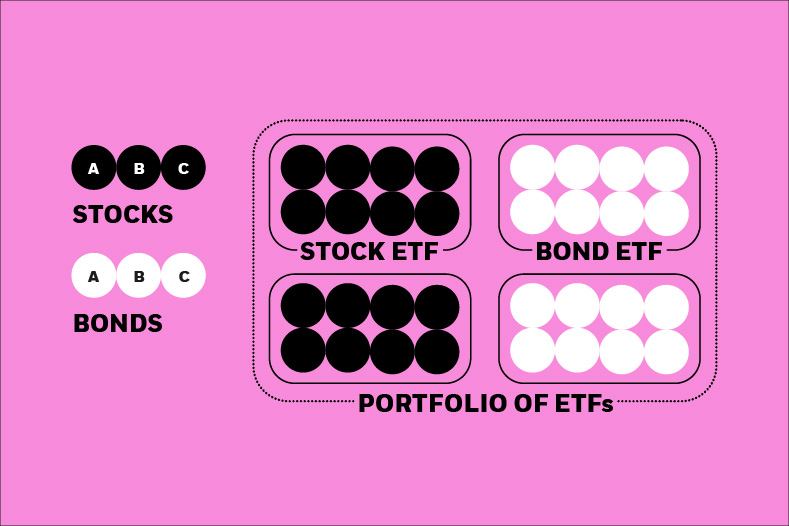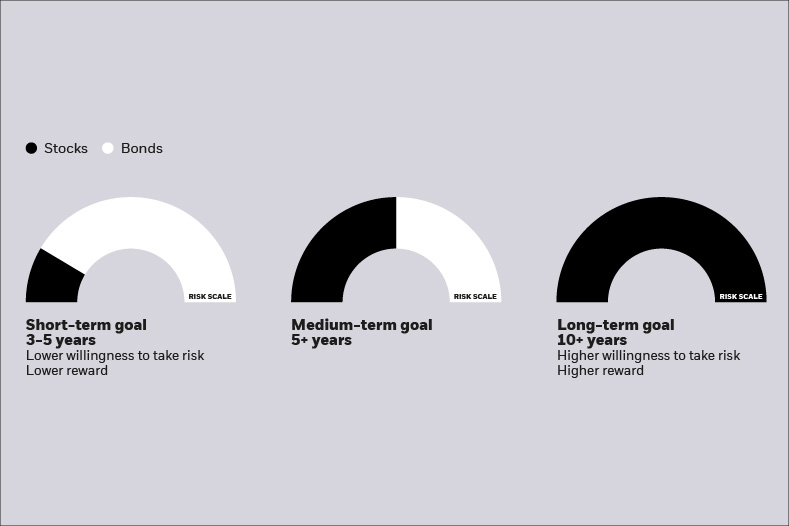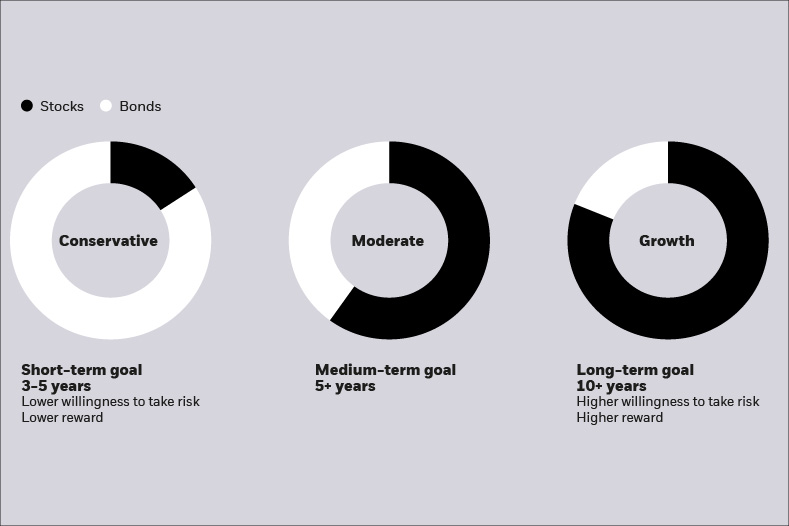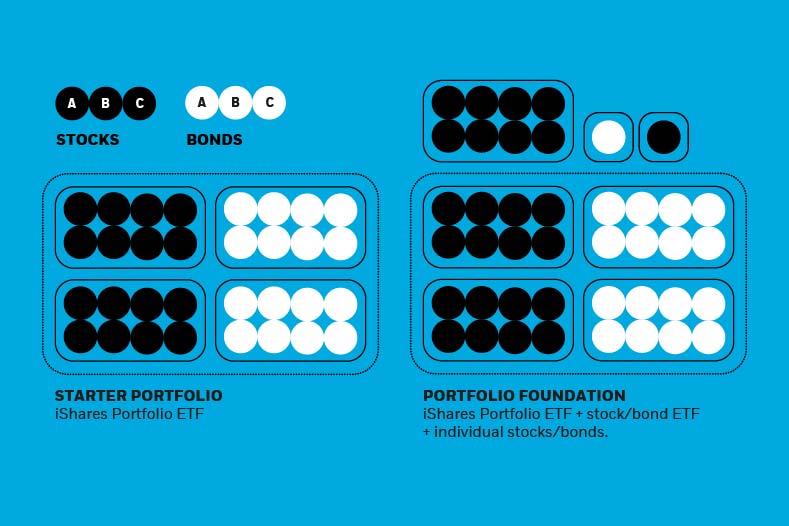Capital at risk. The value of investments and the income from them can fall as well as rise and are not guaranteed. Investors may not get back the amount originally invested.

MAKING INVESTING EASIER
Introducing iShares Portfolio ETFs


iSHARES PORTFOLIO ETFs EXPLAINED
Everyone deserves to experience financial wellbeing: the confidence to meet today’s expenses while saving for retirement and being prepared for all of life’s moments in between.
That’s why we built iShares Portfolio ETFs – a simple range designed to help you invest to build wealth that will serve you throughout your lifetime. Pick the ready-made ETF that suits your goals and the level of risk you’re happy to take.
WHAT ARE PORTFOLIO ETFs?
- An Exchange Traded Fund (ETF) is a pool of investment securities, usually stocks or bonds, wrapped into one vehicle, a ‘fund’. ETFs provide access to a diversified selection of stocks or bonds, usually at a lower cost than purchasing the individual stocks or bonds yourself.
- A portfolio ETF is made up of several single ETFs that invest in individual stocks and bonds across a wide range of companies and governments to create a truly diversified portfolio.
- iShares Portfolio ETFs typically hold 15-25 ETFs giving you exposure to over 8,000 individual stocks and bonds*
*Source: BlackRock as of March 15, 2024.

Risk: Diversification and asset allocation may not fully protect you from market risk.
For illustrative purpose only and subject to change.
Bonds are a way for governments or companies to borrow money from investors, in exchange for income, which is paid out on a regular basis.
Bonds play an important role in building a diversified portfolio and provide investors with 3 potential benefits:
- A stream of income generally higher than cash1
- A method to counterbalance the fluctuations in stock prices that investors may encounter when holding stocks2
- A preserver of capital (i.e. your savings) while potentially providing more yield than idle cash. Yield refers to the income earned on an investment over a specific period, typically expressed as a percentage of the investment's value.
1With bonds, there is a greater level of risk to your money because they can go up and down in value, but this can potentially lead to higher returns. Additionally, in a high inflation environment, the cash held in bank current accounts or deposit savings are at risk of losing value as inflation will reduce the buying power of your money over time.
2Bonds generally exhibit lower price volatility compared to stocks. Bond prices are primarily influenced by changes in interest rates and the issuer credit profile, which tend to be less volatile than the factors affecting stock prices, such as earnings reports, market sentiment, and economic indicators. Historically, investors used bonds to diversify their investments and reduce the impact of market volatility.
WHY ARE BONDS IMPORTANT FOR PORTFOLIO DIVERSIFICATION?
Many investors begin their journey by investing in ETFs composed of stocks, often those tracking an index such as MSCI All Country World (ACWI) or S&P 500 index. Introducing bonds, a different type of investment to stocks, to your investment portfolio may bring added portfolio diversification benefits. A truly diversified portfolio will have exposure to a mixture of different types of investments, including stocks and bonds.
Risk: Diversification and asset allocation may not fully protect you from market risk.
WHY iSHARES PORTFOLIO ETFs
Expertise
Trust is important - iShares is part of BlackRock, one of the world’s largest asset managers, with global insights and local expertise. So, you can be confident your money is in safe hands. Source: Bloomberg, March 2024.
Diversification
We're on your side - the more you spread your investments the more you spread risk. That’s what iShares Portfolio ETFs do, they diversify across a variety of assets, making sure all your eggs aren’t in one basket.

Affordable
It doesn’t have to be expensive - investing can protect your savings by helping beat inflation. It doesn’t take much to start, using ETFs we keep costs low and help more people invest for their future.
Simple
The hard work is done - you simply pick the ready-made fund that suits your investment risk preference: Conservative, Moderate or Growth. It’s easy to get started and then the experts will take it from there.
CHOOSING THE RIGHT RISK PROFILE
- The mix of stocks and bonds held in your portfolio can have a big impact on your long-term returns. Stocks could help you achieve higher returns than bonds but are considered riskier.
- A conservative portfolio will typically have a higher allocation to bonds than stocks while a growth portfolio will have a higher allocation to stocks than bonds.
- Over the long-term the day-to-day ups and downs associated with stocks can be less of a problem, but it all depends on how long you want to invest for. The longer you plan to keep your money invested, the more risk you may be willing to take.

DISCOVER iSHARES PORTFOLIO ETFs
iShares Portfolio ETFs are designed to help you manage risk while growing your savings. Compare these three ETFs and pick the one that fits your goals, time horizon, and risk appetite.

INVEST IN iSHARES PORTFOLIO ETFs WITHIN YOUR ETF SAVINGS PLAN
With an ETF savings plan you can invest a flexible amount in ETFs every month, starting from just £1. This offers you flexibility, especially if you prefer to invest regularly rather than a set amount once.
iShares Portfolio ETFs are available in many ETF savings plans and there are different ways to think about investing:
- Getting started – For those who are just beginning their investment journey, use iShares Portfolio ETFs to start investing knowing the experts are taking care of managing your money.
- A foundation to build on – For those wanting more choice across multiple investments, use iShares Portfolio ETFs as the core foundation of your portfolio and complement this base with other ETFs you wish to invest in.
The beauty of the savings plan, once you have chosen the ETFs that are right for you, all you have to do is decide how much you want to invest and how often.

